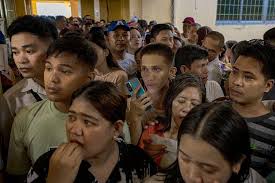The recent midterm elections in the Philippines have captivated the nation, with unofficial partial vote counts unraveling a surprising narrative. The battleground for Senate seats has witnessed a clash between candidates supported by President Ferdinand "Bongbong" Marcos Jr. and those backed by Vice-President Sara Duterte, daughter of former president Rodrigo Duterte. However, unexpected results have pointed towards a swing favoring independent politicians not aligned with either dynasty.
If Marcos' Senate picks secure more seats, it could bolster his chances of impeaching Sara Duterte for alleged misuse of state funds. Such an outcome would prohibit her from pursuing the presidency in 2028, amplifying the stakes of these elections even further. Beyond the Senate races, voters also cast their ballots for candidates vying for positions in the Congress, alongside numerous governors, mayors, and city councilors.
Voting came to a close at 19:00 local time, with the anticipation of unofficial results looming. The tension surrounding power, survival, and potential revenge has added an extra layer of intrigue to the unfolding political drama in the country. The outcome of these elections could significantly reshape the political landscape of the Philippines.
One of the significant victories in these elections was Francisco "Isko" Moreno Domagoso reclaiming Manila's mayoral post, promising to "make Manila great again" and building on the successes of his previous term. Meanwhile, former vice-president Leni Robredo is poised for a landslide victory in the mayoral race of Naga city, showcasing resilience and continued support from her base despite previous setbacks.
Unexpected results have shaken up the Senate race, with candidates like Francis "Kiko" Pangilinan and Paolo Benigno "Bam" Aquino storming into the winning circle. These outcomes have defied poll predictions and complicated President Bongbong Marcos' ambitions for Senate control, setting the stage for a recalibration of political alliances and dynamics.
The unfolding narrative of the elections has shed light on the intricate web of Philippine politics, marked by familial feuds and shifting alliances. Candidates like Imee Marcos, initially aligned with her brother's slate, have seen shifts in their political positioning, reflecting the complexities of navigating a volatile political landscape. The deep-rooted connections and rivalries within political dynasties have added layers of unpredictability to the electoral process.
As the nation awaits the final tally and official results, the implications of these elections are far-reaching. The unexpected outcomes and underdog victories have underscored the dynamic nature of Philippine politics, where alliances are forged and broken, and power dynamics constantly shift. The midterm elections have not only shaped the future trajectory of the country's leadership but also highlighted the resilience and adaptability of political players in a rapidly evolving landscape.
In the coming days, as the dust settles and the official results are announced, the true impact of these elections will become clearer. The interplay of power, ambition, and public sentiment has woven a captivating narrative in the Philippine political saga, setting the stage for a new chapter in the country's democratic journey.
These elections have been a testament to the vibrancy of Philippine democracy, where the voice of the people reverberates through the halls of power, shaping the course of the nation's future. As the country navigates the aftermath of the elections, the lessons learned and the outcomes achieved will resonate far beyond the confines of the ballot box, shaping the country's political landscape for years to come.

